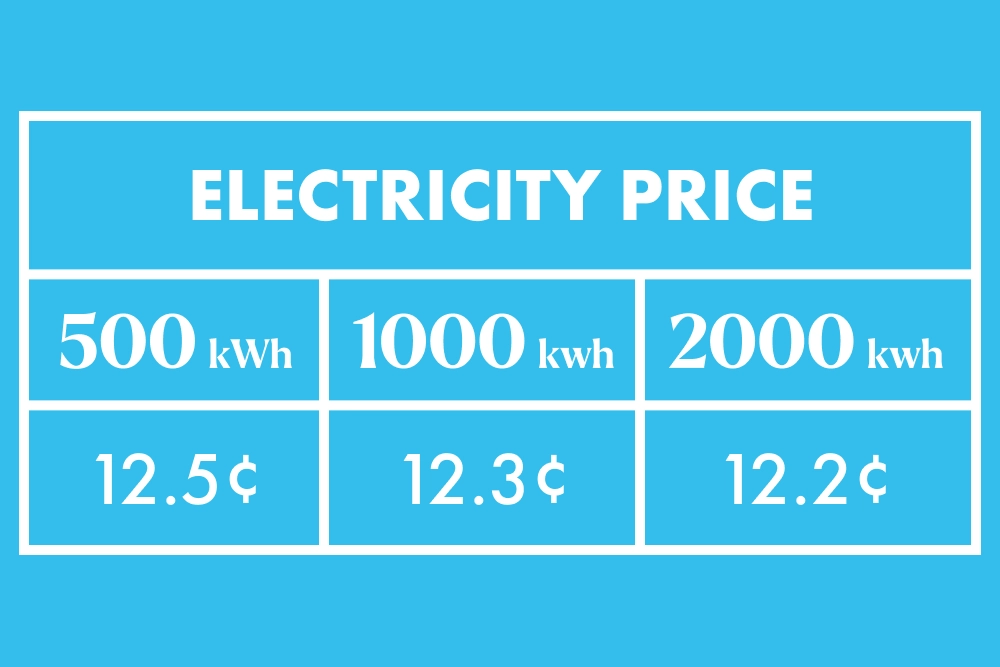Has the Texas Grid Been Winterized?
3 minute readIn February 2021, Winter Storm Uri brought record-breaking cold temperatures to Texas for nearly a week. This storm exposed a
Home > Learning Center > The Deregulated Texas Energy Market > Why Texas Has Three Electricity Prices
3 minute read • Last update June 2025

The Public Utility Commission of Texas (PUCT) requires retail electricity providers to create an Electricity Facts Label (EFL) for every plan they offer in order to disclose the details of those plans to customers.
One of the requirements of the EFLs is to include the average price of electricity on that plan at three levels of energy consumption: 500, 1000, and 2000 kWh.
As it turns out, these three prices do not refer to a unit price you may pay per kWh for electricity, and they do not apply to ranges of energy consumption. Rather, they represent the average price per kWh you would pay if you happened to use exactly 500, 1000, or 2000 kWh during a billing period.
The average price at each of the three usage levels is calculated by combining all of the aspects of a bill that may include:
It would be very unlikely to use exactly 500, 1000, 2000 kWh in a month — in fact, the average monthly usage in Texas is actually 1094 kWh.
While the three usage levels may be unrealistic, they can give you a good idea of what your average price may be in different-sized homes. For example, a small apartment may use about 500 kWh, a large apartment or small home may use around 1000 kWh, and a medium-to-large-sized home may use 2000 kWh or more.
Because the different charges on your bill are either fixed, per kWh, or applied based on overall usage, that changes the average price at the 500, 1000, and 2000 kWh on the table in the Electricity Facts Label. Here’s why:
With a simple fixed rate plan, your bill will consist mainly of three charges:
Both the energy charge and delivery rate are per kWh costs, while the delivery charge is a fixed monthly cost.
That means the more electricity you use, the lower your average price because the fixed charge is “spread out” more across the per kWh charges.
This same logic applies to fixed-rate plans that include base charges.
Similar to base charges, a usage fee will typically be a fixed amount, but it will only apply when you consume a specific amount of energy.
This variability will widen the differences between the average prices at 500, 1000, and 2000 kWh.
Bill credit plans are generally the most confusing to evaluate and feature some of the widest variation in average price between the three usage levels.
When you use the right amount of electricity, a bill credit is applied. That brings down the average price for one of the three usage levels, most commonly at 1000 kWh.
This is where it gets tricky. Energy providers offering bill credit plans will advertise the low average price at 1000 kWh and hope that you do not open the Electricity Facts Label to discover how the higher-than-average energy charge leads to a very high average price at 500 and 2000 kWh.
At BKV Energy, our number one recommendation for electricity shopping is to always, always, always check the Electricity Facts Label before enrolling in a plan. There are many plans in the marketplace designed to trick you. Reading the fine print of an EFL and gaining a full understanding of all the charges that may or may not be applied to a bill is key to securing savings on your monthly bills.
Shopping for electricity and want to see how much a plan may cost? Enter the details from an EFL and some of your past usage data into our electricity bill calculator. We’ll calculate your estimated bill for you.
At BKV Energy, we’re proud to offer simple, transparent, and affordable electricity plans to Texans. Our plans do not include extra fees such as base charges or usage fees. Plus, with our 30-Day Power Pilot you can try us for 30 days without the worry of paying an early termination fee.
Enter your zip code below to get started.
Graham Lumley, Digital Marketing Manager at BKV Energy, leads digital and traditional marketing strategies, focusing on educating Texans about the state's deregulated energy market. With over 8 years of marketing experience, he creates content to help consumers understand and save on their energy bills, bringing a fresh and dynamic approach to the industry.

In February 2021, Winter Storm Uri brought record-breaking cold temperatures to Texas for nearly a week. This storm exposed a

Switch holds are restrictions placed on electric meters that prevent customers from switching electricity providers. These statuses are meant to
Get $50 off your electric bill!
Use code BKVEJOINUS50
Enter your zip code to shop BKV Energy's affordable, fixed-rate Texas electricity plans. Use the promo code for $50 off your electric bill.